 |  |
By David Kier
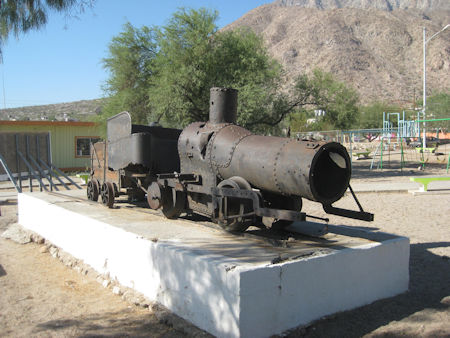
Once again, the surprises that a little exploring in Baja will provide attract those with a sense of adventure. One such surprise is the 1895 railroad line between the ghost-town site of Las Flores and the base of the Sierra La Libertad mountain range. That was where a cable tram bucket line brought ore down 3,500 feet from the San Juan mines at the top of the mountain. The gold and silver ore was processed at the stamp mills in Las Flores where 300 people once lived. A visit first to the wonderful museum in Bahía de los Angeles will provide a look at the cable tram ore bucket system. It is on display outside the museum. The train engine from Las Flores and an ore cart from San Juan are on display in the Bahía de los Ángeles town plaza. The museum is just a block west of the plaza.
The ore was first brought just over a mile from the mine to the top of the tramline using a mule-powered railroad. Next, the ore came down the mountain to the desert floor in the cable line buckets. The railroad ran from the cable terminal platform to Las Flores using about 6 miles of tracks. The tracks and ties were removed and recycled leaving the railroad bed. It has been said that Antero Diaz used the railroad tracks for framing his fishing resort ‘Casa Diaz’ starting in the late 1940s.
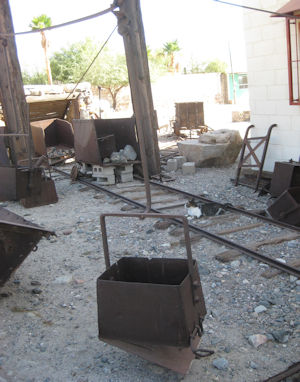
The train engine was transported from Las Flores to the town plaza in the 1980s to preserve it from vandalism. The smoke stack seen in early photos was taken before the move. Las Flores is 9.7 miles south from the pavement in Bahía de los Angeles over a graded dirt road going to Punta San Francisquito and other locations to the south. Las Flores was just west of the graded road and the jailhouse is the last intact building. It can be seen, 500 feet west of the road and a side road leads over to it. The railroad engine was originally sitting just north of the jailhouse.
The railroad bed can be seen just west of the jail house and it can be followed south as it vanishes and reappears going to the terminal platform where the ore buckets dumped their load into the train cars. Some of the line can be seen in satellite images especially near the platform at the southern end where the line curls around to redirect the train back downhill to Las Flores, 840 feet lower in elevation.
The railroad bed is easily seen again 2.3 miles south of Las Flores, now on the east side of the graded road, just before the graded road curves to the left. At this left curve in the graded road, a narrow auto track continues straight ahead. The next 2.3 miles are for off-highway vehicles only and the overgrown brush could add what some call “Baja pin stripes” to your vehicle. There is a fork 4.6 mile from Las Flores or 2.3 miles from the graded road. Most traffic has gone left at this fork, used as a desert motorcycle course. Take the right fork and soon turn uphill. The railroad line to Las Flores is crossed twice but there is no visual evidence of either as shrubs hide the line. At the second crossing, 4.8 miles from Las Flores (0.2 mile from the motorcycle course), park and hike to the right (north) to see the railroad bed and soon the elevated railroad line as it curves uphill to the terminal platform. The platform once had a giant wheel for the cable to the top of the mountain. The whole enterprise was simply spectacular, given the remote location. The mine shut down during the 1911 Mexican Revolution and never fully reopened.
The auto road goes only ½ mile further where the foot trail begins to hike to the top of the mountain. The trail formerly used by mules to bring the ore down. 2017 was my third visit to the platform location since first seeing it in 2002.
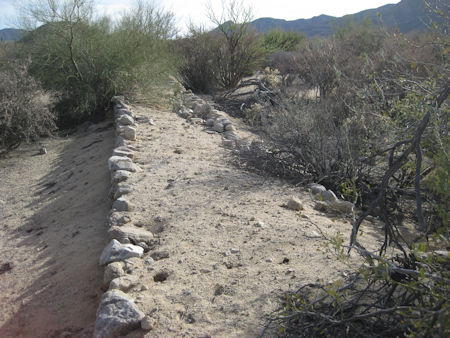
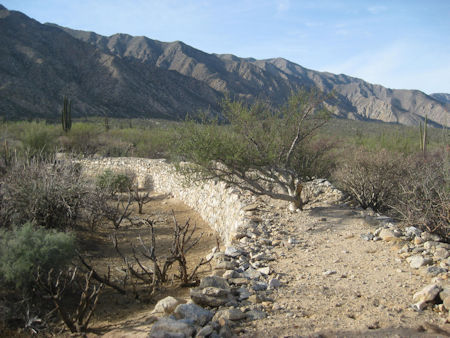
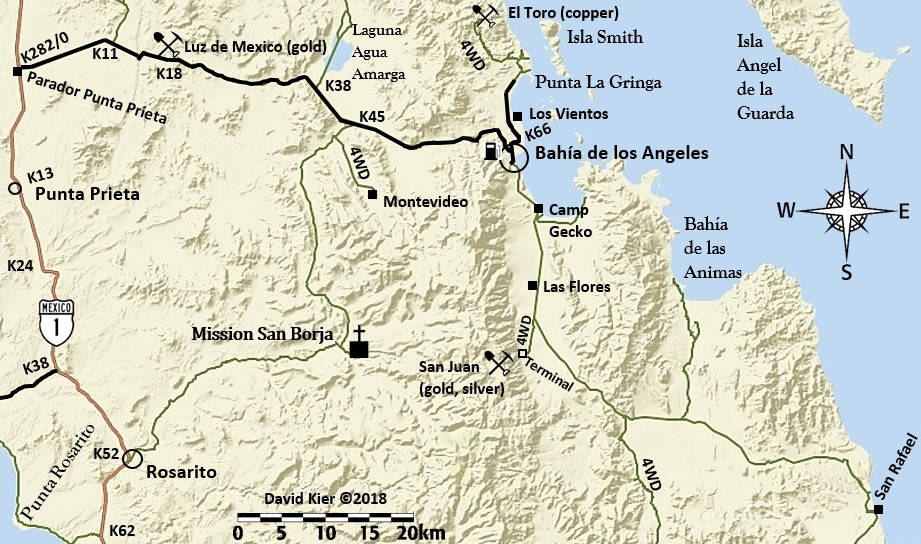

About David
David Kier is a veteran Baja traveler, author of 'Baja California - Land Of Missions' and co-author of 'The Old Missions of Baja and Alta California 1697-1834'. Visit the Old Missions website.

Very knowledgeable and helpful.

Fabulous service. The video to get to the San Ysidro/Tijuana SENTRI lines was perfect and peace of...